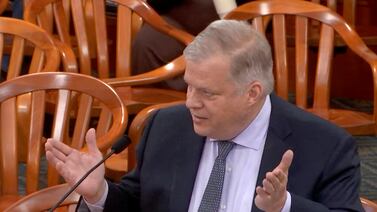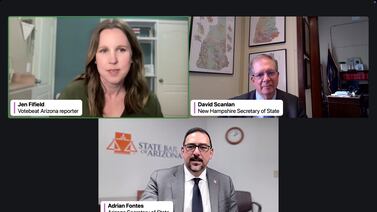The administration of Gov. Tom Wolf is looking to decisively quash a request by state Senate Republicans for sensitive voter information that the lawmakers made as part of an inquiry into the 2020 election, which they falsely charged was fraudulent.
In a motion filed Monday, the Pennsylvania Department of State and attorney general’s office asked the state’s Commonwealth Court to dismiss as moot last year’s request to turn over voters’ partial Social Security and driver’s license numbers.
They argued that because the most recent legislative session ended on Nov. 30, the state Senate Intergovernmental Operations Committee’s authority and the subpoenas it issued have effectively expired. The brief quotes opposing counsel’s remarks at a hearing in June, when Republican lawyers said the subpoena would expire on that date.
The committee nonetheless plans to challenge the motion, according to Matt Haverstick, an attorney who represents the Republicans on the panel.
The subpoenas are just one part of a long-languishing review by state Senate Republicans of the 2020 general and 2021 primary elections, an ongoing endeavor that took them as far away as Arizona and led to intraparty feuds that played out in the primary race for governor.
The committee had also agreed to a contract in 2021 worth more than $250,000 with a little-known limited liability company, Envoy Sage, to examine that data if and when it came, and also to investigate tips of fraud and third-party election interference.
It isn’t clear whether the company ever performed any work. A phone number for Envoy Sage was perpetually busy, and the company didn’t respond to an email. Votebeat and SpotlightPA have requested records from the Pennsylvania Treasury showing how much the company was actually paid, but have not yet received them.
But the direction of the inquiry in 2023, or if it will even continue, is unknown.
A throughline for the session
The inquiry began in July 2021 when Republican state Sen. Doug Mastriano, of Franklin County, acting as chair of the committee, took up former President Donald Trump’s call for a “forensic audit” of the 2020 election and sent letters to three counties requesting election materials from them for auditing purposes.
The move caused some to bristle, and Mastriano did not last long as chair. Then Senate President Pro Tempore Jake Corman, of Centre County, replaced him with Republican state Sen. Cris Dush, of Jefferson County.
Earlier in the summer, Dush and Mastriano had visited Maricopa County, Arizona, to tour an election review that Senate Republicans were conducting there.
Once Dush took over, the committee’s focus turned to the Department of State. In September 2021, it issued a subpoena to the agency requesting the names, addresses, driver’s licenses, and partial Social Security numbers of all Pennsylvania voters, as well as all communications between state elections officials and elections officials in all 67 counties. That fall is also when the committee signed the contract with Envoy Sage.
The request for voters’ private information drew strong rebuke from Senate Democrats, the Department of State, attorney general’s office, and nonprofits, who collectively sued in Pennsylvania’s Commonwealth Court to block it, arguing it violated the Pennsylvania Constitution’s provision on a citizen’s right to privacy, among other things.
The inquiry mostly stalled as the case wound its way through the court over the next year, eventually resulting in oral arguments before a three-judge panel this September.
Lawyers for Senate Democrats and the Department of State argued at the hearing that Republicans had not clearly articulated why they needed the information, but Republican lawyers argued the Senate committee should be given “the benefit of the doubt” that it can be trusted.
Judges on the panel seemed sympathetic to the argument that the committee’s subpoena was necessary to its ability to investigate and craft legislation, local NPR affiliate WITF reported at the time, but the court has not issued a ruling in the three months since that hearing.
Clifford Levine, a lawyer for Senate Democrats, said he would have anticipated a ruling by now. He also said he thinks there are still questions surrounding the inquiry that Republican senators should answer, namely how much it has cost taxpayers.
What’s next
The Commonwealth Court will now consider the Department of State’s motion to dismiss, though it isn’t clear when that decision will come.
It is also unclear whether the committee will continue with the underlying inquiry at all, even if the court allows the subpoenas to remain in force.
Republicans still hold the majority in the chamber and will make assignments to the Senate intergovernmental committee in early January. Dush (R., Jefferson), who led the inquiry, did not return a call seeking comment this week. A spokesperson for interim Senate President Pro Tempore Kim Ward (R., Westmoreland) did not return a call seeking comment Thursday.
Levine is skeptical the inquiry will continue in the next session, given that the politics of the moment have shifted.
“You have a new president pro tempore in Ward rather than Corman, and you don’t have Mastriano running and that was part of the politics of it,” he said.
There is also no currently active contract between the Senate and Envoy Sage, according to the state’s contract database.
State Sen. Art Haywood (D., Montgomery, Philadelphia) said things have been in a holding pattern as both sides awaited the court’s ruling. Haywood and his wife joined the suit in their capacity as private citizens and voters not wanting their information to be released.
He said he has supported well-meaning election reform in the past, but the subpoena and resulting litigation make him suspicious of the inquiry’s aims.
“We would be in support of the motion to dismiss,” he said. “At one time, there was a big sense that [the subpoena] was urgent and something had to be done now. And now we’re a year later and nothing has been released, so the whole urgency I think is over.”
Carter Walker is a reporter for Votebeat in partnership with Spotlight PA. Contact Carter at cwalker@votebeat.org.






